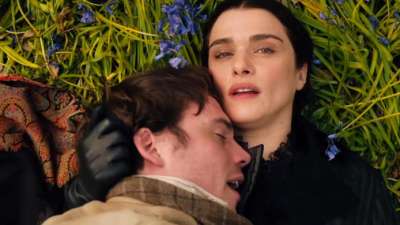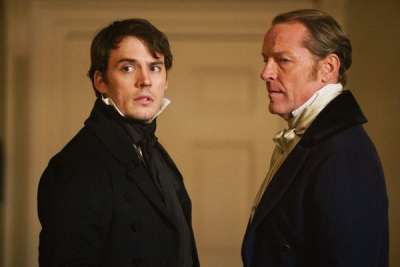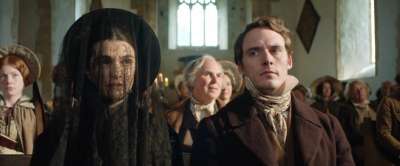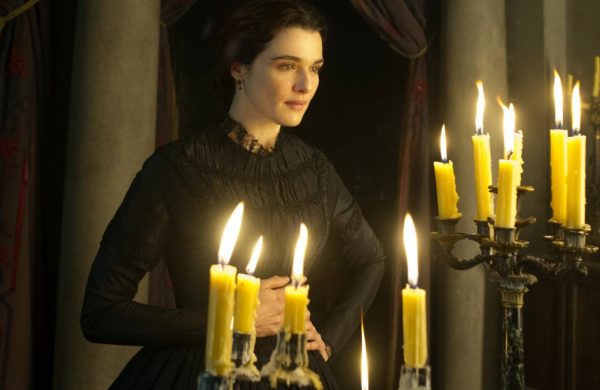“My Cousin Rachel” – a film review by Gary Chew
If you’re a movie fan easily engrossed in tales about the personal minutiae of the leisure class, then have I got a flick for you!
My Cousin Rachel, written by Daphne du Maurier and published in 1951, is a story that, when referring to “the family jewels,” means exactly that. And not only does the narrative wrap around much more than just family gems but, ultimately, who inherits the whole bloody jewel box … like the Ambrose Ashley estate on the Cornwall coast … with its servants, animals and all else.
 It was Ambrose who took his orphaned seven-year-old cousin Philip (Sam Claflin) under his wing, putting the lad in line to inherit Ambrose’s goodies … including the Ashley jewels … when the younger Ashley reaches the age of twenty-five.
It was Ambrose who took his orphaned seven-year-old cousin Philip (Sam Claflin) under his wing, putting the lad in line to inherit Ambrose’s goodies … including the Ashley jewels … when the younger Ashley reaches the age of twenty-five.
As Philip matures further, along with the mid 19th century, Ambrose begins taking his summers in the warmer climes of the Italian Peninsula, leaving Philip in England. In Italy, Ambrose marries Rachel Sangaletti (Rachel Weisz), a widow and also a cousin to Ambrose and Philip. She is of Italian and English blood.
Ambrose writes Philip that he and Rachel are not returning to Cornwall. But soon, Ambrose is sending letters to Philips that say the elder Ashley has become ill. Not long after, Philip travels to Italy to see what is going on with Ambrose. Arriving at Ambrose and Rachel’s villa, Philip finds that Ambrose has died and Rachel gone.
 Rachel finally shows up in Cornwall after Philip has returned home. A large development in the plot surfaces about now that indicates Ambrose had not yet signed a newer will that would give Rachel his full inheritance. Since it’s unsigned, legally everything is still going to Philip. This turn of events renders Rachel penniless, so Philip invites her to live with him at the large estate near the coast.
Rachel finally shows up in Cornwall after Philip has returned home. A large development in the plot surfaces about now that indicates Ambrose had not yet signed a newer will that would give Rachel his full inheritance. Since it’s unsigned, legally everything is still going to Philip. This turn of events renders Rachel penniless, so Philip invites her to live with him at the large estate near the coast.
This is where the plot thickens to such a degree that it would more than fill the amount paragraphs I’ve scheduled for this review. Just know the film gets rather unpredictable. It’s also difficult to ascertain whether Rachel is actually on an evil, selfish path, or that it just seems she is. All of this, of course, is what’s buzzing around in the ever-degenerating thought processes of poor Philip, since he has fallen hopelessly in love with her … while always referring to her as his cousin Rachel. That is, until the time he does give her all the family jewels and they make love.
 Philip has mistakenly assumed that Rachel and he will be married. Rachel has a very big surprise for him. And so does the ending of this film, if you haven’t already seen the original My Cousin Rachel. Olivia de Havilland played Rachel and Richard Burton was Philip.
Philip has mistakenly assumed that Rachel and he will be married. Rachel has a very big surprise for him. And so does the ending of this film, if you haven’t already seen the original My Cousin Rachel. Olivia de Havilland played Rachel and Richard Burton was Philip.
\Weisz is the 2017 version of Rachel. She didn’t have to use all of her bountiful talent to play this role. But that doesn’t mean she doesn’t do a good job. Claflin, though, verges on the lame in his role as Philip. But to be fair, Philip’s character in this late version of My Cousin Rachel can easily be dismissed as curiously insignificant. I might be going a smidge overboard in my criticism of Claflin. It’s not easy to discern which is the better reason.
Striking vistas, cinematography and editing ease the drudge of this tragic story, and … as I mentioned: if this sort of mysterious, unrequited love, filled-with-paranoia-and-passion picture show is your cup of tea, you might take an alternate stance. Oh yes, much of the running time, Rachel makes Philip drink lots of her specially brewed tea.

- Movie Review: ‘The Glorias’ - September 28, 2020
- Movie Review: ‘I’m Thinking of Ending Things’ - September 10, 2020
- Movie Review: ‘The Burnt Orange Heresy’ - August 31, 2020


